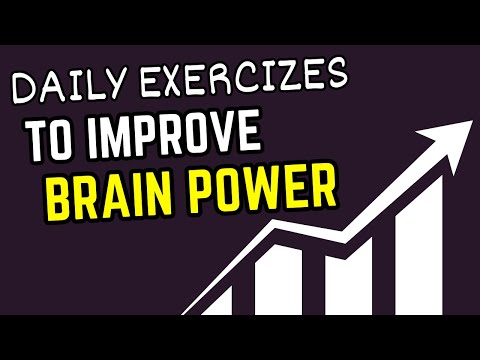Hey there, brainiacs! Want to find out how you can supercharge your brain for the day ahead? We’re diving into some daily brain workouts that’ll keep your neurons nimble, ready to boost your brain power every morning. Let’s get going!
Exercise Number One: Meditation
Kickstart your day with a few minutes of quiet mindfulness meditation. It improves focus, reduces stress, and enhances emotional well-being. It’s as simple as finding a quiet spot, closing your eyes, and focusing on your breath. Make these exercises a regular part of your day. Meditation, for instance, is an excellent way to start. It’s been shown to increase gray matter concentration in the brain, which is responsible for learning and memory.
It also enhances self-awareness and promotes a sense of calmness and balance, setting a positive tone for the day. Whether it’s just 5 minutes or half an hour, the length doesn’t matter as much as the consistency. Find a comfortable position, focus on your breath, and try to clear your mind of all distractions. This simple exercise can drastically improve your energy and performance throughout the day.
Related:
6 Natural ways to overcome depression
Do pushups every day and see what happens to your body
10 Signs you are an empath with excellent mental skills
10 Choices you will regret in 10 years
Exercise Number Two: Reading
Stimulate your mind by reading a book, newspaper, or an article. Reading enhances comprehension, expands your vocabulary, and improves memory. Even 10 to 15 minutes of morning reading can have significant benefits. Picking up a book or reading an insightful article provides knowledge and stimulates the brain. It engages your imagination, develops your critical thinking skills, and improves focus and concentration.
Reading can introduce you to different perspectives, cultivate empathy, and expand your understanding of the world around you. You can choose any genre or subject that interests you. The important thing is to challenge your brain by engaging with diverse and stimulating content. For added benefits, consider reading out loud. This can further enhance your memory and your abilities. So, go ahead, grab a book, newspaper, or e-reader, and kickstart your day with a dose of brain-boosting reading.
Exercise Number Three: Puzzles
Engaging in puzzles such as Sudoku or crosswords is a highly beneficial mental exercise. These puzzles don’t just entertain; they boost your brain, enhancing various mind skills. They require you to think strategically and logically, which boosts problem-solving skills and improves critical thinking.
These games demand attention to detail and concentration, which can significantly enhance focus and memory retention. Furthermore, puzzles enable the production of dopamine, a neurotransmitter that makes you feel engaged and motivated.
Every time you successfully complete a puzzle, you experience a burst of dopamine, which not only makes you feel good but also motivates you to take on more challenges. The satisfaction derived from solving these puzzles provides great stress relief, providing mental relaxation. If I were you, I’d make it a habit to challenge myself with a puzzle every morning, just to keep my brain active and engaged.
Exercise Number Four: Learn Something New
Exploring new knowledge areas every morning can provide incredible benefits for your brain health. When you learn something new, your brain forms new neural pathways.
This not only improves your cognitive skills but also contributes to the brain’s adaptability known as neuroplasticity. Whether you’re learning a few phrases of a foreign language, practicing a few chords on a guitar, or absorbing a fascinating fact about the world, each new piece of information challenges and stimulates your brain. This learning process improves memory, boosts creativity, and can even delay brain aging.
So, consider dedicating a part of your morning routine to learning something new. You can pick a topic related to your work, a hobby you’ve been meaning to explore, or a subject that’s always intrigued you. Engage your curiosity and let it drive your learning for a healthier, happier brain.
Exercise Number Five: Journaling
Journaling is yet another excellent way to kickstart your brain in the morning. It provides a medium to express your thoughts and emotions and nurtures the brain, encouraging imagination and enhancing memory. When you write down your ideas, your brain engages in the process of mental structuring, which improves clarity of thought and problem-solving skills. Moreover, journaling promotes mindfulness, encouraging you to engage with your thoughts and feelings without judgment.
This practice can be therapeutic, helping to reduce stress and anxiety. By decluttering your mind, you start your day with a clearer headspace and a more focused mindset. So, grab a pen and notebook and spend a few minutes each morning writing. It could be about your dreams, your plans for the day, or simply your thoughts. This simple habit can have a profound impact on your health and emotional well-being.
Exercise Number Six: Drawing or Painting
Engaging in creative activities like drawing or painting is a potent way to exercise your brain, particularly the right hemisphere. This part of your brain governs spatial abilities, face recognition, and visual imagery, all crucial elements in artistic pursuits. When you draw or paint, you’re exercising these mental functions, effectively giving your brain a comprehensive workout. However, the benefits extend beyond purely cognitive enhancement.
The act of creating art can also be incredibly therapeutic. It provides a form of self-expression, allowing you to explore and communicate your emotions, thoughts, and experiences visually. This process can lead to reduced stress levels, contributing to a healthier brain.
Starting your day with some artistic expression doesn’t mean you have to create a masterpiece. It’s about enjoying the process and letting your imagination run free. Whether you’re sketching a simple object, painting a landscape, or creating an abstract piece, the goal is to stimulate your brain and tap into your creative side, setting a positive and creative tone for the day.
Exercise Number Seven: Dancing
With its vibrant mix of physical movement, coordination, and rhythmic awareness, dancing is a wonderful workout for both your body and your brain. It challenges your brain to coordinate your body’s movements with the rhythm of the music, creating a dynamic mental workout.
When you dance, you’re engaging in multiple brain functions at once – kinesthetic, rational, musical, and emotional – enhancing neural connectivity. The need to recall dance steps improves memory and focus, while the spatial awareness needed to move around strengthens your perception and decision-making skills. In addition to these benefits, dancing also releases endorphins, the feel-good hormones that lift your mood and reduce stress.
This emotional uplift can further boost cognitive functioning, given the strong connection between emotional and mental health. Starting your day with a few minutes of dancing can be a fun, invigorating way to wake up both your body and your brain. Whether you’re following a dance workout, freestyling, or just grooving to your favorite tunes, dance your way to cognitive health.
Exercise Number Eight: Gardening
You know, gardening is often seen as just a hobby, but it’s so much more than that. It’s a unique mix of physical and mental exercise that does wonders for your mental well-being. When you get your hands dirty in the garden, you’re giving your brain a workout too.
Think about it – planning out your garden layout and figuring out what plant needs is like solving a puzzle. It’s all about problem-solving and applying what you know. And when you’re delicately seeding or pruning, you’re using those fine motor skills that can help improve your coordination and dexterity. But here’s the best part: gardening is seriously therapeutic.
It’s a chance to connect with nature, and the connection has been proven to lower stress levels, help you relax, and boost your mood. It’s like your thoughts get grounded, and you feel this sense of calm and tranquility that’s so good for your mental health. Let’s not forget the joy of watching your plants grow because of all the care you put into them. It’s such a satisfying feeling, and it triggers the production of positive neurotransmitters in your brain.
So whether you have a huge backyard or just a little indoor herb garden, nurturing those plants can kick-start your day with a real sense of accomplishment. Why not give it a try, right? Gardening is a brain-boosting, mood-lifting, nature-connecting experience that can do wonders for your well-being.
Exercise Number Nine: Deep Breathing
Deep breathing is a deceptively simple practice that carries profound benefits for brain health. By regulating your breath, you influence your nervous system, notably the rest and digest parasympathetic nervous system.
This can lower your heart rate, reduce blood pressure, and promote a state of calmness and relaxation, offering immediate stress relief. When you engage in deep breathing exercises, you’re increasing the flow of oxygen to your brain. This has been shown to improve focus, enhance cognitive function, and stimulate creativity. It’s also a wonderful exercise to ground yourself and achieve clarity of thought, providing a peaceful start to the day.
Incorporating a few minutes of deep breathing into your morning routine is simple yet effective. Find a quiet, comfortable space, close your eyes, and focus on taking slow, deep breaths, filling your lungs, and then gently exhaling. Over time, this small daily practice can have substantial benefits for your brain health and overall well-being.
Related:
6 Natural ways to overcome depression
Do pushups every day and see what happens to your body







Leave a Comment